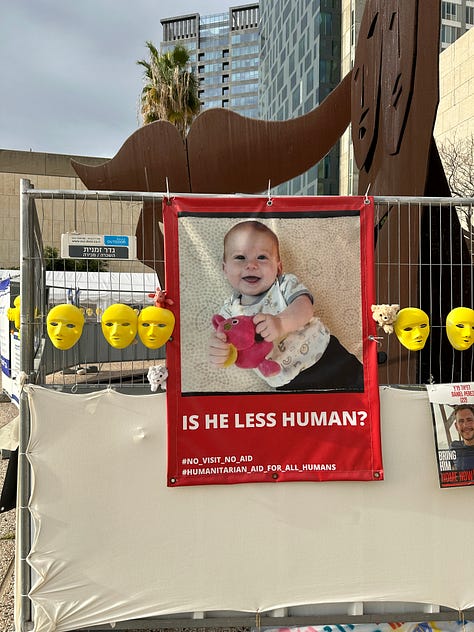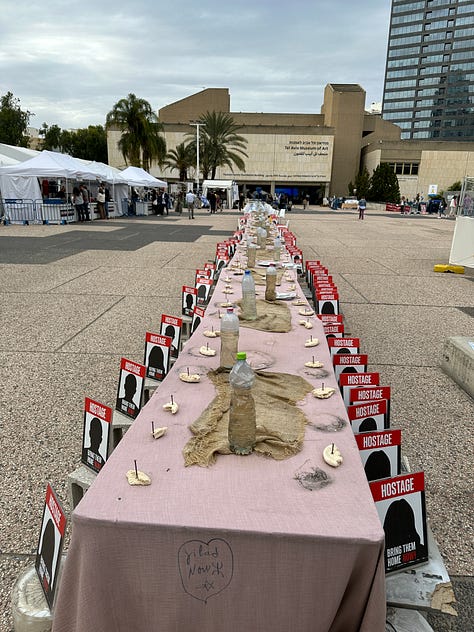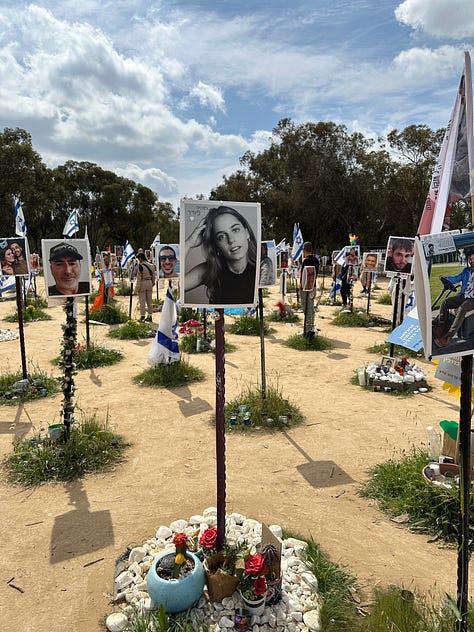Five Days in Israel during a War
I went to be a witness, and to volunteer, and to remind myself who I am at the core.
While the Rebel Author Substack focuses on writing and publishing, this week I’d like to share some insights from my recent trip to Israel. That trip included meeting writers, attending a literary event with Jennifer Friedman Lang and Judy Labensohn and participating in a writing workshop led by Joan Leegant. We can really only write about what we know, and there is no better way to know that to see and do and take it all in.
Israel is beautiful at this time of year. The rolling hills are green and yellow and white, with wild mustard growing at the roadside and daisies opening their eyes under a warming sun. Nights are cool, and days are breathable. My skin pinks as I walk through Tel Aviv, stopping to admire the happy people folk dancing on a Saturday morning and the three elderly men playing violins beside the beach.
This is a country at war, but it’s a place filled with people who love the land and the people on it deeply. One night, a man draped in an Israeli flag joined hordes gathered in the center of Tel Aviv to advocate for change. Another night, a little girl in a yellow shirt held a handmade sign at a vigil for the hostages in Modiin.
Everywhere, life is flowing, but there is also emptiness. The wind at the Western Wall plaza echoes. Except for soldiers and school groups, no one is there. Gone, the hordes of tourists who so frequently come to press palms and faces into the ancient stones. I move close to the Kotel and though I rarely pray, this time I ask God to keep the nation of Israel safe, to unite the Jewish people, to stem the tide of hatred, to bring us all into peace.
Even as war has raged in the aftermath of Hamas’ vicious attack on October 7th, a new National Library of Israel opened. It is an impressive building, filled with books about this land, this ancient history, my ancestry, my tradition. On the day I visit, tables are filled with people reading, studying, working. In the front, behind glass, are chairs, one for each hostage still held in Gaza. Below a picture of each person is a book carefully selected to align with their interests. Such care, such devotion, such knowing of the people—where else in the world would that happen?
The Messages I Take Away
When they hear why I’ve come, people thank me.
“You came just to volunteer? Wow.”
I’m glad I could do it, I say. It feels like nothing is more important than this.
A week earlier, I’d led a Rosh Chodesh (new month) writing workshop at my synagogue. This month is Adar, the month when Jews are commanded to increase our happiness.
When the month of Adar enters, we increase in joy. Talmud, Taanit 29a
The Torah defines happiness as celebrating with others and taking care of less fortunate members of our community.
I went to Israel to help. To see and carry home the truth, to defy the damning headlines. It’s a place of great passion and fun, but this time I only wanted to hear people’s voices, see what they endure, lend a hand. I picked oranges until my clothes were drenched in sweat and my fingers sliced raw by the branches. Still, the breeze was as sweet as those juicy fruits.
Near the Gaza border, I cut tomatoes into slices for burgers. All the people working at that pop-up were volunteers. They feed 10,000 soldiers a day, from donated food. I sat at a table with a family from Mexico and employees of Bezek, Israel’s biggest communications company. Someone put music on a loudspeaker and the song, “Am Yisrael Chai” (the nation of Israel lives) blared out. We started dancing and singing, and the sun was bright and warm, and I almost cried from the joy of it.
At Hostage Family HQ, I lined up plastic yellow ribbons on a piece of posterboard, dropped a dot of glue on each, then pressed in metal pins. These, they sell to raise money for the hostage families’ advocacy, and so they can sue Hamas in The Hague. I ask everyone at the table to tell me their Aliyah story. One came from Philadelphia, another from London, another was born here but her family had emigrated a generation earlier from South Africa.
A young woman named Dana volunteers for the Bring Them Home social media team. On October 8th, she quit her job and came to volunteer as part of a 30-person team posting about each hostage so people won’t forget them.
My first flight was delayed, and I hardly slept the whole time I was there, but I was happy every moment of this trip. I think I was living the message of the rabbis, about how our tradition defines happiness: to help others, to give to those in need. I have been fortunate all my life to go on vacations that indulge my senses, but those trips contain a lonely kind of emptiness. This trip was all about giving, and I’ve never been so happy.









Why It Was Important to Go
The day after I returned home, a woman interviewed me for her podcast. She told me she was adopted and after a DNA test, learned she is half Jewish. Her biological father’s surname was Cohn, my maiden name.
“They tell me those were the high priests,” she says.
Yes.
In Jerusalem, I bought a necklace bearing the priestly blessing. I am a daughter of a cohain, I carry this blessing through generations, back to the time of the Temple.
Jews have called this land holy for thousands of years. I pressed my palms into the soft stones of the last standing wall of the Temple. Some call it the Wailing Wall, to connote the sadness of having our holy place destroyed. I prayed beside soldiers in khaki skirts and religious women in wigs, all of us eyes-closed, leaning into hope.
On Shabbat, at a writer-friend’s table, we introduced ourselves by name, place of origin and reason we were there. One person said, “I’m here because I’m Jewish.” Another said, “I’m here because I’m a Zionist.” I said, “I’m here to volunteer and be a witness.”
On Sunday I participated in a writers workshop about place. Start your stories with the place, the instructor said. The sand on the sidewalk. The way barren cracked land is now green with trees. The sharp taste of the wild mustard at the roadside. The juice of a ripe orange soaking my chin.
Driving to Jerusalem, my guide said, “That’s your tree over there,” pointing to a grove planted over decades by Jewish National Fund. American Jews like me grew up putting coins, tzedakah, in little blue boxes at Hebrew school to plant trees in the land of Israel. Our contribution to our ancestral land has turned it verdant and productive, thriving and giving.
I went to be there for my brethren, but I went for myself, too. To remind me of who I am. Since October 7th, I’ve been wearing my star of David necklaces, proudly exhibiting my Jewish identity. I’m pulled to be among people who get it, who feel what I feel, all the complicated emotions of this trying time.
In Israel, every door has a mezuzah slanting against the lintel. Stores. Cafés. Hotels. In the taxi on the way to the airport on my last night, the driver, whose name was Shay, like my son, Shaya, said, “You should make Aliyah. Soon. Before Passover, if you can.” Aliyah means to ascend, and it’s the word used to refer to Diaspora Jews who emigrate to Israel.
I wish, I said and laughed. That’s a month from now.
“It’s important,” he said. He was young, the father of a three-year-old. His parents came from Iraq and Egypt because there was nowhere else they could go.
“We have to pray,” he said. He looked like he belonged in a nightclub. No yarmulke. Tight shirt. Fitted jeans. His skin was Middle Eastern dark, his hair cropped close. He didn’t look like someone who invokes prayer, but he encouraged me to beseech God to protect us, to bring all the Jews together, to keep us strong, to keep us safe, and I nodded along.






What It Means to Be a Witness
At the site of the Nova music festival, pictures of the 364 killed and 44 kidnapped stand where they were dancing before being gunned down. Parents, friends, family members have personalized the memorials. One mother wrote about how special her son was. I couldn’t stop the tears. It could’ve been my sons. It could’ve been me.
Signs said, When you get home, dance forever. If I don’t come home, know I love you. Zachinu l’ehov: we had the chance to love.
I visited the car cemetery. That’s what they’re calling the place where all the burned cars were brought. Charred rusty hulks of former vehicles are stacked, and those not entirely destroyed are parked as if in a lot, a carpool spot, except no one is coming back.
As for the cars that had people in them when set ablaze, where the people melted into the metal, the car was buried with the humans. Jews believe every piece of a human is precious. We comb massacre sites—remnants of a bus bombing, the aftermath of a terrorist attack—for any piece of flesh to bury it properly.
We ate lunch in Sderot, a town close to Gaza where terrorists destroyed the police station. On October 7th, thousands flooded across the border. They knew where to go because they’d spent years planning this attack, posing as friends, workers building houses for peace-loving Israelis, all the while collecting information, the people trusting them, believing peace was possible despite borders and barriers.
People just want to live. It’s not a Jewish thing. But this constant focus on life, on living, on lifting up and seeing the humanity in another, that is a Jewish value. It’s so deep, it’s part of our DNA.
My last stop before flying home was Hostage Square. Opposite the building where the War Cabinet meets daily, this open plaza is filled with artistic statements.
A gallows with Hebrew words saying: Time Is Up.
A long table with seats for every person still captive. Half a pita, bottles of dirty water, to represent what they are given to eat.
A tunnel to mimic what it’s like underground. It was scary to walk through, but we emerged into the light. When will they?
A butterfly beneath a net, symbolizing the freedom they yearn for.
A tent with bound and bloodied legs sticking out of it.
So many paintings with poetic statements and colorful multimedia displays.
Members of the attacked kibbutzim described what it was like to live there, how much peace was in the hearts of the residents.
“It’s like a bad dream you can’t wake up from,” one woman said. “You can’t believe it’s real.”
I met a woman who made Aliyah 40 years ago. All those years, she was never scared. Not when rockets rained down nor when sirens blared. Now, she’s scared. It’s an existential fright, a fear we don’t know what to do with, can’t find our way out of.
But on Shabbat morning, I watched Israelis folk-dance. Three elderly men played violins on the sidewalk. Young families kicked up sand; teens played volleyball and surfed. Religious couples strolled along the sea. Life went on. Because it has to. Because we must cherish the moments we have. Israelis get this. When will the rest of the world?
Thank you for reading the Rebel Author Substack! Paid subscribers are invited to a Zoom Coaching Call on Wednesday at 12 pm ET. Please consider becoming a paid subscriber!




Lynne, Hi. Thank you for describing so eloquently what life is like in my country these days. It is surreal to me that the whole world can be against us and support barbaric murderers and rapists of babies, children, and civilians. It is not a brush off to say that your critic of this piece is anti Semitic. The Palestinian children may be innocent but that's only because they haven't been indoctrinated yet. The Gaza population want Israel's destruction. That's their mission. We have a right to defend ourselves and prevent the next October 7th. No apologies, Lynne. We do all we can to avoid civilian death. Hamas does all they can to hide behind their civilians and blame Israel when they are collateral damage. Those who won't see this think it gives them the license to overtly hate Jews and Israel.
Thank you for painting a real picture of what must be a beautiful land. You made me feel like I was there seeing real people doing every day things in the country they love.